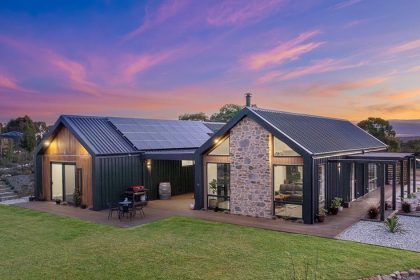Summer may be drawing to an end, but so is the life of the way we fuel gas homes and even the traditional Aussie barbecue.
The gas that fires up the nation’s six million outdoor grills will be transitioning to net zero starting next year, with traditional LPG bottles being replaced with bioLPG.
The new type of LPG has the same molecule make-up as regular LPG, but is instead derived from renewable sources like wastes or as a by-product of creating sustainable fuels.
The climate-conscious change is also cost-effective, with barbecues, cylinders, and pipes requiring no changes, as current gas bottles are easily swapped out as a one-for-one replacement.
Brett Heffernan, CEO of Gas Energy Australia, says the introduction of the new green gas gives Aussie families and business owners a choice to avoid electrification.
“Over 2 million Aussie families today rely on LPG for everyday indoor cooking, hot water and heating. The benefits of using LPG and bioLPG are many,” Mr Heffernan said.
“If you already have LPG in your home, there is no need to make the expensive switch to electricity. Net zero bioLPG will be available over the same transition time frame as net zero electricity via the grid but without the hefty price tag.”
Economic modelling data from Frontier Economics show some CO2 electrical appliances can cost households $12,000 in appliance and installation costs alone.
While the home’s running natural gas appliances don’t typically have the right type of electrical wiring installed for electrification, meaning gas households seeking the change may have to undergo a full rewire, which can cost tens of thousands of dollars.
Benefits of choosing LPG:
- A net zero option
- LPG appliances are cheaper
- A reliable source of cooking, water and heating
- Not dependent on the electrical grid
No rewiring or major connection costs Mr Heffernan says confusion over state-by-state bans on new gas connections had left many Aussies unsure whether LPG was still allowed, and believing electrification was their only option.
“Even the Victorian Government has confirmed that its 2024 ban on new gas connections in residential and government buildings does not apply to LPG. These imposts and extra fees only apply to natural gas,” he explained.
“If you have natural gas in the home and are concerned about government plans to cajole you onto electricity, it is easier and cheaper to switch from natural gas to LPG.”
“Sticking with LPG, or switching to it, can save families a small fortune while still achieving net zero over the same time frame as electricity. It also means you can keep on BBQing and be green at the same time.”
The rollout of bioLPG is set to begin in 2025, in time for the famous Australia Day barbie.
To change from natural gas to LPG, contact a licensed gasfitter.







